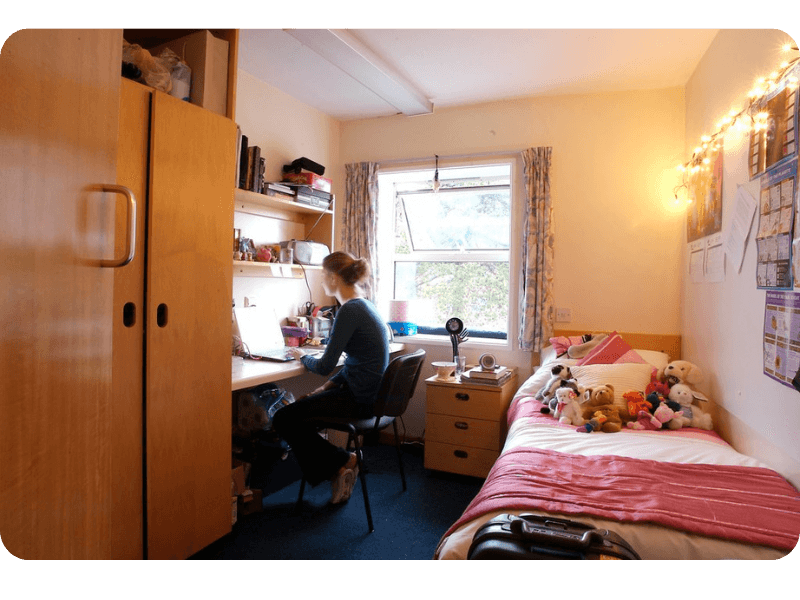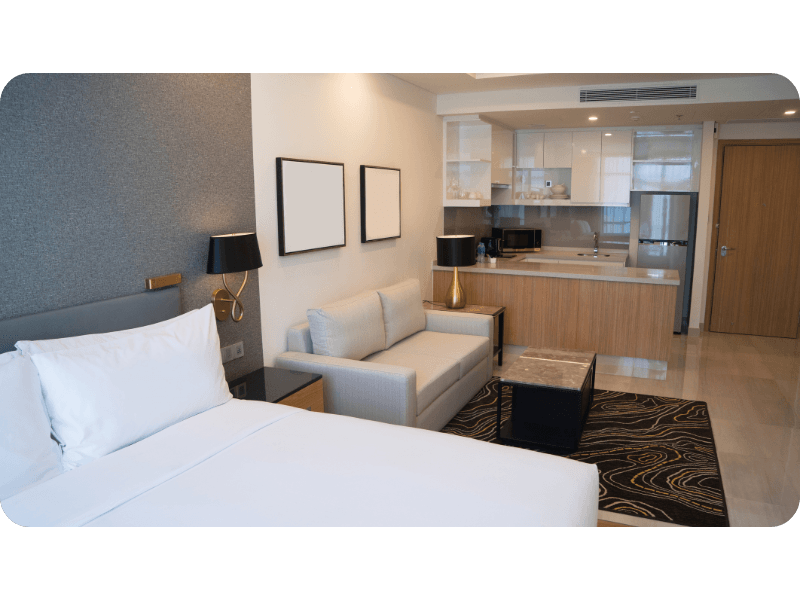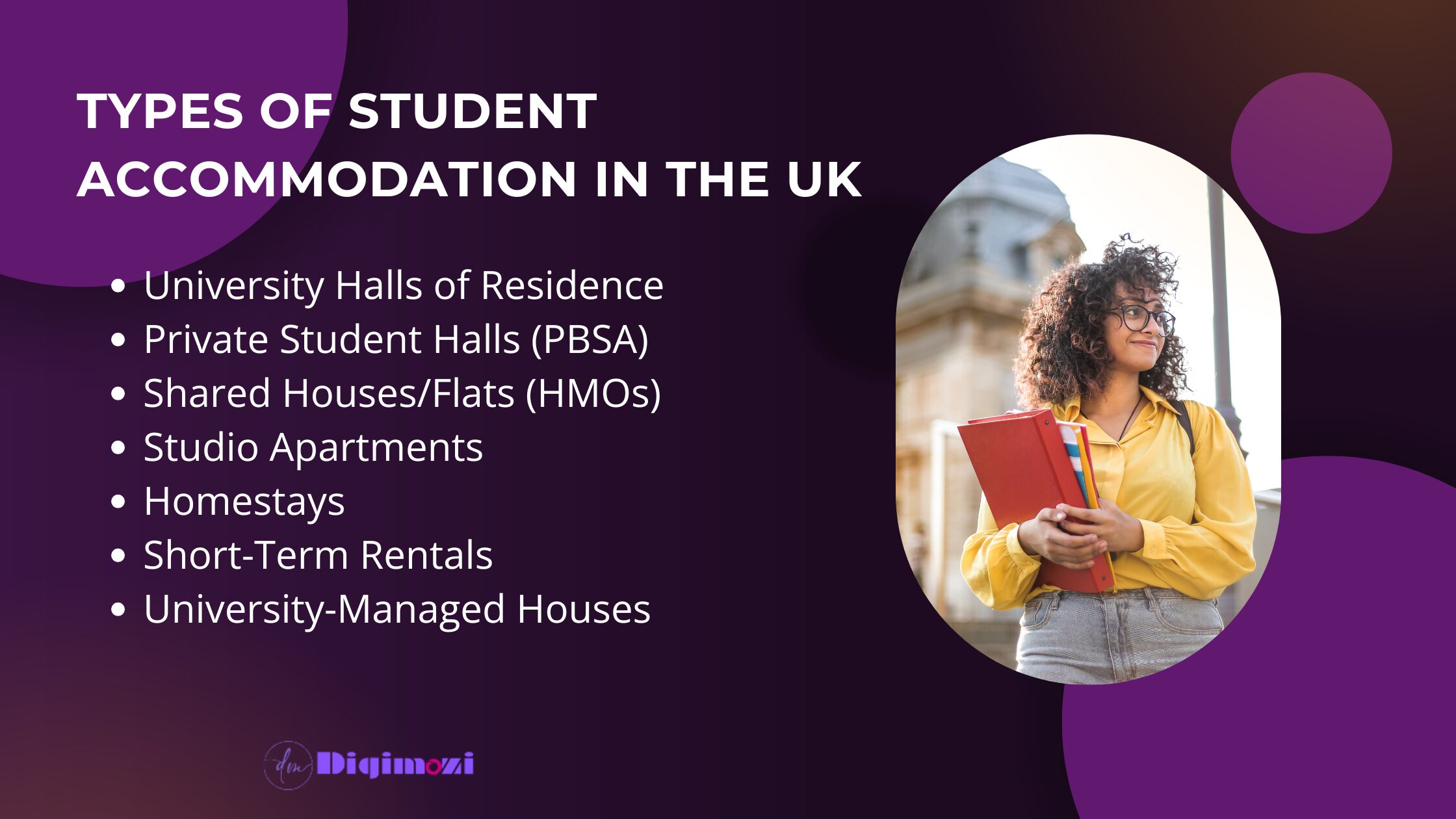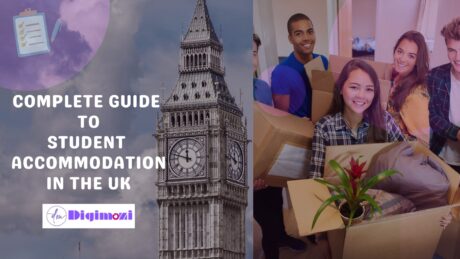There are 7 main types of student accommodation in the UK
- University Halls of Residence
- Private Student Halls (PBSA)
- Shared Houses/Flats (HMOs)
- Studio Apartments
- Homestays
- Short-Term Rentals
- University-Managed Houses
Choosing the Right Types of Student Accommodation in the UK
Choosing the right student housing in the UK is critical for international and domestic students alike. From university halls to private PBSA, each option impacts your budget, social life, and academic success. Below, we break down all UK student accommodation types, including pros and cons, costs, and expert tips.
- Cultural adjustment: 68% report homesickness in their first term *(UKCISA 2023)*
- Budget constraints: Rent consumes 73% of the average student’s monthly budget
- Safety concerns: 89% prioritize 24/7 security when selecting housing
This makes understanding all types of student accommodation in the UK critical for a successful transition.
Every type of accommodation has its own pros and cons to consider before making a decision about selecting the right type of accommodation.
We discussed here all the features of every type of student accommodation in the UK, including Pros and Cons.
You can follow our tips and stats while choosing the right type of accommodation. Let’s break down your confusion and get quick clarity with our quick review. We provided helpful resources and links for you if you want more information.
Average costs range from £300–£1,500/month depending on type and location. First-years often choose halls, while international students frequently opt for PBSA.
Let’s break down here
1. University Halls of Residence

These are accommodation blocks owned and managed by your university, usually located on or very close to campus. Most offer furnished single rooms, with shared kitchens or bathrooms.
Pros:
- Conveniently on-campus or nearby
- All bills, security, and internet are included
- Great way to meet lots of fellow students (social atmosphere)
- Frequent support from university staff, and managed by UK university housing teams for safety
Cons:
- Shared facilities (kitchens, sometimes bathrooms)
- Less independence, more rules
- Can get noisy
Best for:
Most first-year and international students as it makes settling into the UK easier.
Expert Insight:
“University halls help international students build their first support network. 92% of our first-years say it eased their transition.”
– Sarah Wilkins, Accommodation Manager, University of Manchester
2. Private Student Halls / Purpose-Built Student Accommodation (PBSA)
Modern buildings, often not university-owned, but specifically built for students wanting premium amenities like en-suite rooms or studio flats. Well-known brands include Unite Students, iQ, and Student Roost.
Pros:
- Top-notch amenities (study lounges, gyms, games rooms, cinema rooms)
- All-inclusive rent (bills, WiFi, security)
- Some offer en-suite bathrooms or studio flats
- Great way to make friends across universities
Cons:
- Can be more expensive than standard university halls
- Sometimes less campus “feel”
Best for:
International students and those wanting a bit more comfort and independence.
80% of PBSA have 24/7 security teams-check for CCTV coverage.
Why International Students Choose PBSA:
- 24/7 concierge & parcel handling
- Premium facilities:
- On-site gyms (68% of PBSA)
- Cinema rooms (42%)
- Study pods with free printing (91%)
Top Providers:
- Unite Students (126+ UK locations)
- iQ Student Accommodation (77 properties)
- Chapter Living (London-centric)
Cost Breakdown:
- London: Studios £1,100–£1,800 | En-suites £800–£1,200
- Manchester: Studios £700–£1,100 | En-suites £550–£850

A traditional house or flat you rent with a group of students, often moving in with friends for your second year or beyond. Managed by a landlord or agency. SpareRoom ( Ads by Landlord and Agencies ) or OpenRent ( Ads by Landlord only) to find housemates.
Pros:
- Often cheaper than halls, especially in smaller cities
- More independence—you pick your housemates
- Flexibility in how you live
- HMO housing (House in Multiple Occupation).
- Off-campus student rentals with flexible leases.
Cons:
- Bills usually not included (gas, electricity, water, internet)
- Shared cleaning duties
- Variable standards—important to check before you move in
Tips:
- Use trusted websites like SpareRoom or OpenRent
- Always view the property before paying any money
Step-by-Step for International Students to Choose Accommodation:
- Use SpareRoom’s “Buddy Up” to find housemates
- Verify landlord credentials via NRLA
- Calculate true costs:
- Rent: £300–£600
- Bills: £90–£150 (energy, water, council tax exemption)
- Internet: £25–£40
Red Flags to Avoid in Student Accommodation:
- Landlords refusing virtual tours
- Requests for cash-only deposits
- No Tenancy Deposit Scheme registration
Expert Quote:
“Always view properties in person. 60% of scams target students who pay deposits remotely.”
– Sarah K., NUS Housing Advisor
4. Studio Apartments

A single room with your own kitchenette and en-suite bathroom—perfect for those who value privacy.
Pros:
- Complete independence & quiet study environment
- No shared spaces to clean/maintain
- Ideal for mature/postgraduate students
- Good for quiet study and mature students
Cons:
- Usually the most expensive option (£1200–£1,800 per month in London)
- 68% require 12-month contracts
- Limited social interaction opportunities
- Can get lonely if you like company
Fewer are available for undergraduates
5. Homestays
Living in a private bedroom with a local family in their home. Often includes meals and all bills with average stay: 3-6 months
Pros:
- Immersive cultural experience & language practice
- Meals and bills included
- Supportive home environment (helpful for improving English)
- Great for under-18s requiring guardianship
Cons:
- Less independence, may have curfews or house rules
- Must adapt to family life
- Limited guest policies
Expert Tip:
“Homestays help combat homesickness. 78% of our international students report better cultural adaptation through this option.”
Best for:
Short-term language students, under-18s, or those seeking strong cultural immersion.
6. Short-Term Rentals for Student Accommodation
Temporary accommodation, usually for a few weeks or months. Options include hotels, serviced apartments, hostels, or platforms like Airbnb (56% offer student discounts), Spotahome (verified rentals), and University summer housing
Pros:
- Flexible—you’re not tied down by long contracts, Weekly/Monthly contracts available
- Fully furnished & equipped
- Ideal for Exchange students (1-2 terms), Internship placements
- Good for students on exchange, doing internships, or arriving late
Cons:
- Higher weekly cost
- Not always “student community” focused
- Limited availability during peak seasons
- Fewer student community integrations
7. University-Managed Houses
Properties owned or vetted by the university, but not on campus. Like a hybrid between halls and private renting. Off-campus properties inspected by Uni staff, with 24/7 maintenance support, and the duration is an average 9-month contract
Pros:
- Managed by the university—more secure and reliable
- Bills sometimes included
- Access to university support
Cons:
- Limited spaces—typically for those who apply early. Only 12-15 properties per university
- Strict occupancy rules (no subletting)
- Less modern than PBSA options
Types of Student Accommodation in the UK – Comparison Table
Type | Avg. Monthly Cost | Best For | Contract Length | Key Perks | Social Level |
University Halls | £400–£800 | First-year students | 40–52 weeks | Social life, bills included, Academic Proximity, Safety | High |
Private PBSA | £500–£1,200 | International students | 44–52 weeks | Modern amenities (Gym, Cinemas, Free Printing stations), global community | Medium-High |
Shared House (HMO) | £300–£600 | Budget-conscious | 6–12 months | Independence, lower costs, local experience | Variable |
Studio Apartment | £700–£1,500 | Postgrads/Privacy | 12 months | Quiet, self-contained living, study-focused | Low |
Homestay | £500–£900 | Cultural immersion | Flexible | Meals included, family support, cultural training, and cost savings | Medium |
Short-term rental | £200–£600 (weekly) | Short courses | Flexible | Flexible contracts, Fully Furnished, Global Standards | Low |
Uni-managed house | £400–£850 | Vetted option | 9–12 months | Hybrid Model, Priority Access, Cost Predictability | Medium |
Source: 2023 National Student Accommodation Survey, UCAS
Pro Tip: 92% of students who choose accommodation with 24/7 support staff report better stress management during exams. Always verify if your housing includes:
- Emergency maintenance response times
- Mental health resources
- Parcel receipt services
Need help matching perks to your priorities? Use our Accommodation Selector Tool (simulated link) based on budget, location, and lifestyle needs!
How to Choose the Best Student Accommodation for You?
Ask yourself what you consider while choosing student accommodation :
- What is my budget (don’t forget utility bills if they’re not included)?
- Do I want to be close to campus or the city centre?
- Am I looking for a sociable environment or more privacy/quiet?
- Am I staying for a whole year or just part of it?
- How important is security and extra support?
Top Tips for Student Accommodation:
- Book early! Rooms go fast in popular cities, especially before September.
- Read every contract before signing—look for hidden fees, who pays the bills, and deposit terms.
- Ask for help from your university’s accommodation or international student office.
- Join student groups online to find housemates or advice.
- Check trusted platforms and use only safe, protected payment methods.
Key Statistics for types of student accommodation in the UK
- The average UK student pays £535 per month in rent (Save the Student, 2023).
- 570,000+ international students studied in the UK in 2022.
- Around 74% of first-year students live in university halls.
Final Thoughts & Actionable Steps for Student Accommodation in the UK
Finding the right student accommodation in the UK can feel overwhelming, but you’ve got lots of options—each with its own perks.
Take these steps in the process of choosing student accommodation:
- Start researching as soon as you accept your offer.
- Decide your priorities: budget, location, independence, social atmosphere.
- Use your university’s accommodation service and trusted rental platforms.
- Connect with other international students for support and advice.
Remember: The sooner you start, the more choices you’ll have. If you get stuck, universities are there to help—email or call the student housing office. Good luck and get ready to enjoy your time in the UK!
Suggested Resources for Student Housing in the UK
Practical Tools & Resources for Student Accommodation
Some of the resources help you in the hunting process for the right type of student accommodation, as given below. If you are a full-time student, you will get some exemption that depends on the type of accommodation and the tenants’ role in your stay.
- Complete Guide for Student Accommodation in the UK
- UK Council Tax Exemption Form (All full-time students qualify)
- Tenancy Deposit Protection Checker
- International Student House London
Downloadables:
- [📥 Accommodation Budget Calculator]
- [📥 Contract Review Checklist]
FAQ about Types of Student Accommodation in the UK
What types of student accommodation are there in the UK?
University halls, private halls (PBSA), shared houses/flats, studio apartments, homestays, short-term rentals, and university-managed houses.
How do I apply for student accommodation?
Usually via the university’s accommodation office for halls, or directly with private landlords/providers for other types. Early application is recommended.
Is it cheaper to live in university accommodation or private housing?
University halls are often more expensive but include bills; shared private housing (HMOs) is usually cheaper but bills may be extra.
Can I live off-campus as a first-year student?
Yes, but most first-years choose on-campus university halls for the social and academic support.
Is a deposit required for student accommodation?
Yes, most types require a deposit—university halls usually require a smaller holding deposit; private rentals require a larger tenancy deposit protected by a government scheme.
Are bills included in student accommodation?
Most university-owned and private halls include bills; shared houses/flats may or may not include them—always check your contract.
Can couples or mature students stay in student accommodation?
Some universities offer couples’ or family accommodation, but options are limited and require early application.
What is the minimum length of a tenancy?
University halls usually run for the academic year (40-52 weeks); private rentals can be 6-12 months, studio and short-term lets are more flexible.





